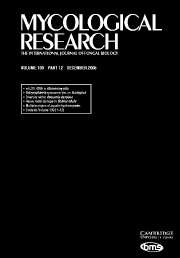No CrossRef data available.
Abstract
This issue of Mycological Research News features the evolutionary origins of ryegrass endophytes, and implications of the cyclosporin experience for bioprospecting.
This month's Mycological Research includes 17 papers. The first demonstrates the successful and stable transformation of the genome in Fusarium circinatum using the Agrobacterium tumifaciens Ti plasmid. Molecular studies include ones on six species of Agaricus to elucidate their breeding systems, further research on the ascomycete order Agyriales, Alternaria alternata isolates associated with pistachio late blight, 16 species of Claviceps, the Entomophthora muscae complex, Hebeloma velutipes, Mycocalicium subtile, Ophiostoma piceae and O. quercus, genera in the Thelebolaceae, isolates identified as Trichoderma aureoviride, Tuber magnatum, and a Venturia associated with aspen blight.
Alternaria alternata, A. gaisen and A. longipes are shown to be distinct species, and the infection process of A. cirsinoxia on Canada thistle is documented. A xylanase gene of Cochliobolus sativus (anamorph Bipolaris sorokiniana) has been characterized, as has an hydrophobin in Metarhizium anisopliae.
The following new scientific names are introduced: Ainoa, and Antarctomyces gens. nov.; Antarctomyces psychrotrophicus sp. nov.; and Ainoa geochroa (syn. Biatora geochroa), and A. mooreana (syn. Lecidea mooreana) combs. nov.
- Type
- Mycological Research News
- Information
- Copyright
- © The British Mycological Society 2001




